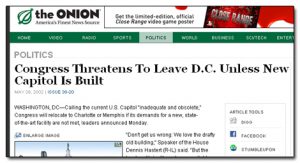 There has been a lot of buzz lately about “fake” news sites and how they may have impacted the recent presidential election.
There has been a lot of buzz lately about “fake” news sites and how they may have impacted the recent presidential election.
Multiple stories have been written on how to spot a fake news story and even President Obama has weighed in calling it a threat to democracy.
There’s only one little problem, fake news has been around since the birth of our nation.
Back in 1782, Benjamin Franklin, who was in France as American ambassador, put together an entirely fake issue of a real Boston newspaper, the Independent Chronicle. In it, Franklin made up a story allegedly from the New York frontier and concerned wartime atrocities by Indians at the behest of the British.
The fake story was sent to his friends and was picked up by real newspapers in New Jersey, Pennsylvania, Connecticut, New York and Rhode Island.
Columnist Leonard Pitts (who appears in the Houston Chronicle) wrote a piece on how fake news is “eating like terminates through the foundations of democracy”. He even goes on to quote Thomas Jefferson who said “If a nation expects to be ignorant and free; it expects what never was and never will be.”
It’s a great quote, but it’s hard to swallow when you learn Jefferson secretly gave money to newspaper editors to spread personal rumors about his enemies which may or may not have been true while the country was struggling to form a new government. Oh well, it still makes for a great quote.
Now in today’s inter-connected world wide web, it’s easy to see how a fake news story can take off like a wild fire. Websites like Facebook are trying to figure out how they weed these stories out (although some reports claim Facebook generates half its ad revenue from fake news sites), so I guess it will be up to us to decide what is true and what is not.
Democracy survived Ben Franklin and Thomas Jefferson’s transgressions, I suspect it will continue to do so after this election as well.
